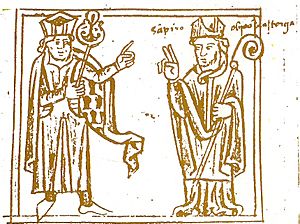Sampiro facts for kids
Sampiro (born around 956 – died 1041) was an important person from the Kingdom of León in Spain. He was a religious leader, a government official, and a smart thinker. Sampiro was one of the first people to write down the history of Spain after the Muslim conquest, and we know his name. He also served as the Bishop of Astorga from about 1034 until he passed away.
It's not completely clear where Sampiro was born. Some say he was born in a place called Iglesia del Campo, near Cacabelos, in the Bierzo region. Others believe he was born in Zamora. Also, historians aren't sure if all old writings about people named Sampiro are talking about the same person or different ones.
Contents
Sampiro's Life and Career
Sampiro started his journey as a young man by joining a monastery, either Sahagún or San Miguel de Camarzana. Later, he had to flee to Zamora because of attacks from Muslim lands. Eventually, he ended up in the royal court in León.
Working for the King
Sampiro worked as a notary (someone who writes official documents) for King Vermudo II (who ruled from 984 to 999). He then held a very important job, called majordomo, under King Alfonso V (who ruled from 999 to 1028). This was the highest position in the royal court. Around 1034, he was chosen to be the Bishop of Astorga.
Sampiro's Historical Writings
Sampiro is famous for his historical writings, known as his chronicle. He wrote it as a continuation of an earlier history called the Chronicle of Alfonso III.
What His Chronicle Covers
Sampiro's chronicle tells us about events that happened between the years 866 and 982. Even though it stops suddenly at 982, it was clearly written in the early 1000s. His work is part of a larger collection of histories that build upon each other, going all the way back to Isidore of Seville's Historia Gothorum. A version of Sampiro's chronicle was also included in another important historical work called the Historia Silense.
Praising King Vermudo
In his chronicle, Sampiro spoke highly of King Vermudo. He wrote that the king was "very wise" because he supported the laws made by King Wamba. Sampiro also said that King Vermudo ordered people to study church laws, loved kindness and fairness, and tried to stop bad things while choosing good.
Historians believe that Sampiro might have made a small mistake about King Wamba's laws. It was actually King Egica who made big changes to the old Visigothic laws. Later, another historian named Pelayo of Oviedo continued Sampiro's chronicle. Pelayo changed Sampiro's praise of King Vermudo into a criticism, giving the king the nickname "the Gouty."
See also
 In Spanish: Sampiro para niños
In Spanish: Sampiro para niños
 | May Edward Chinn |
 | Rebecca Cole |
 | Alexa Canady |
 | Dorothy Lavinia Brown |


